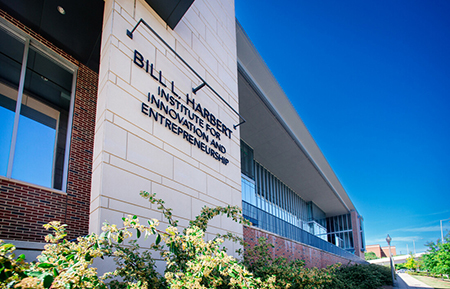 The university established the Bill L. Harbert Institute for Innovation and Entrepreneurship in 2014 to oversee research commercialization, support startup creation and drive economic development. Photography: Steve WoodThe Association of Public and Land-grant Universities has named the University of Alabama at Birmingham a winner of its 11th annual Innovation and Economic Prosperity University Awards. The awards recognize innovative projects or programs in economic engagement.
The university established the Bill L. Harbert Institute for Innovation and Entrepreneurship in 2014 to oversee research commercialization, support startup creation and drive economic development. Photography: Steve WoodThe Association of Public and Land-grant Universities has named the University of Alabama at Birmingham a winner of its 11th annual Innovation and Economic Prosperity University Awards. The awards recognize innovative projects or programs in economic engagement.
UAB received the IEP Innovation award, recognizing exemplary initiatives spurring innovation, entrepreneurship and technology-based economic development.
APLU’s IEP Universities designation program helps higher-education institutions codify, elevate and advance their enterprise-supporting economic and community development while providing national recognition to institutions committed to university economic development. To earn the designation, institutions complete a rigorous self-study and stakeholder engagement process. They also identify their economic development strengths and areas of growth and improvement.
UAB is actively fostering an innovation ecosystem in Birmingham, with a specific emphasis on biotechnology. The university established the Bill L. Harbert Institute for Innovation and Entrepreneurship in 2014 to oversee research commercialization, support startup creation and drive economic development. The Entrepreneurial Development Committee, comprising senior university officials, regularly guides new ventures through challenges and facilitates their progress in the startup pipeline.
“This prestigious recognition from APLU speaks to the continued success of UAB’s partnership, strategic planning, and leadership in growing a robust, technology-based economy for our community, region, and state,” said UAB President Ray L. Watts. “Our world-class research enterprise, our Harbert Institute and Collat School of Business, and departments all over our campus—along with our partners at Southern Research—are fueling innovation and entrepreneurship at historic levels, as we work together to substantially increase the impact of our research on peoples' lives and become the biotech commercialization leader of the Southeast.”
To be eligible for an IEP award, an institution must first earn the Innovation and Economic Prosperity University designation from APLU, which recognizes institutional commitment to regional economic development.
IEP designees conduct a rigorous self-study of their economic engagement activities that includes input from external stakeholders. As part of the self-study, each institution identifies areas for growth and improvement within its economic engagement enterprise and develops an improvement plan. This work demonstrates a commitment to continuous learning and improvement in this kind of engagement vital to universities and their regional partners.
“Universities are instrumental in driving talent development, innovation and the growth of thriving places,” said APLU President Mark Becker. “We’re delighted to recognize the major impact our IEP designees and awardees have on their communities’, states’ and regions’ economies.”
As defined by APLU’s Economic Engagement Framework — a series of tools and publications that helps institutions better know, measure and communicate their work in economic engagement — universities collaborate with their public- and private-sector partners in their states and regions to promote economic growth, competitiveness and opportunity through a variety of efforts across the aforementioned categories.
Some 91 institutions have been named IEP Universities designees since the program was launched in 2012.
“What an honor to be recognized today as the winner of the IEP Innovation Award from the APLU,” said Kathy Nugent, Ph.D., associate vice president and executive director of the HIIE. “We see this as validation that what we are doing at UAB is succeeding. We are leading our state and region into a more fruitful future on the strength of our local partnerships, economic engagement efforts and innovative initiatives. We look forward to continuing success as we build a strong innovative ecosystem at UAB and within Birmingham and the state.”
In the past decade, the HIIE has launched more than 30 startups and currently has more than 15 at varying stages in the university startup formation process. Earlier this year, the HIIE chose to reinvest profits into UAB innovators by launching the Blazer Bridge Fund to support proof-of-concept technologies with commercial potential. The university is also partnering with a local nonprofit to advance workforce development in the biotechnology sector.